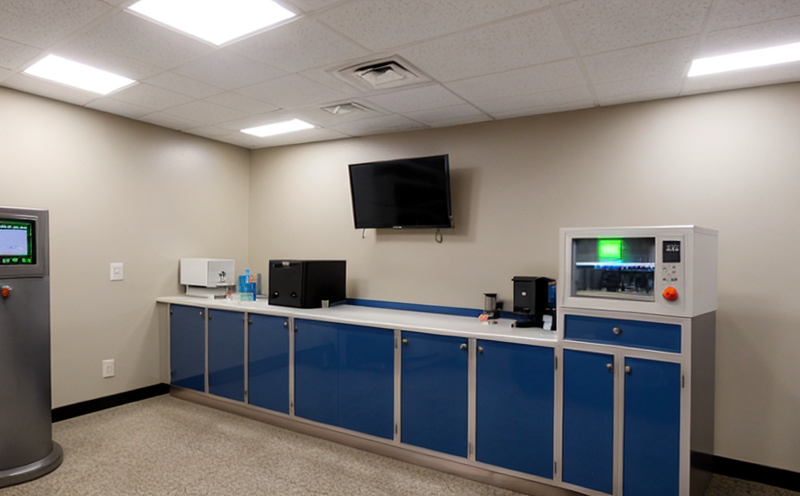ISO 17025 Laboratory Accreditation for Radiopharmaceutical Testing
The ISO/IEC 17025:2017 standard provides a framework that enables laboratories to demonstrate their technical competence in performing specific types of tests or calibrations. For radiopharmaceutical testing, this accreditation ensures the highest level of quality assurance and accuracy. The process involves rigorous evaluation by an external body to verify compliance with international standards.
The accreditation encompasses various critical aspects such as personnel qualifications, infrastructure requirements, operational procedures, and continuous improvement practices. It is essential for organizations involved in radiopharmaceutical research, development, production, and distribution to ensure they meet the stringent requirements set by regulatory bodies like the International Atomic Energy Agency (IAEA), European Medicines Agency (EMA), and FDA.
For radiopharmaceuticals, the testing process can be complex due to the nature of the materials involved. These compounds are designed for medical use in nuclear medicine procedures such as PET scans or targeted radionuclide therapy. The accuracy and precision of these tests directly impact patient safety and treatment efficacy.
The ISO 17025 accreditation not only ensures that laboratories meet the necessary technical standards but also guarantees that they adhere to best practices for managing quality, health, and safety in their operations. This accreditation is crucial for maintaining public trust and regulatory compliance in a highly regulated industry.
One of the key challenges in radiopharmaceutical testing lies in the handling of radioactive materials. The laboratory must have stringent protocols in place to minimize risks associated with these substances. The ISO 17025 process includes detailed checks on radiation safety measures, personnel training, and equipment calibration.
| Aspect | Description |
|---|---|
| Radiation Safety | The laboratory must have a comprehensive plan to manage radioactive materials safely. This includes the use of lead shielding, monitoring devices, and strict access controls. |
| Personnel Training | Staff must undergo regular training on radiation safety protocols and emergency procedures. |
| Equipment Calibration | All equipment used in testing must be regularly calibrated to ensure accuracy. This includes dosimetry devices, detectors, and other specialized instruments. |
The accreditation process also involves a detailed audit of the laboratory's management systems. This ensures that all aspects of operation are aligned with international standards. The audit team will review documentation, operational procedures, and quality control measures to verify compliance.
For radiopharmaceutical testing specifically, this includes reviewing protocols for sample preparation, handling of radioactive materials, and analysis methods. The laboratory must demonstrate its ability to produce consistent and reliable test results under controlled conditions. This is crucial given the precision required in medical applications where even small errors could have significant implications.
The ISO 17025 accreditation not only enhances internal quality control but also strengthens external credibility. It allows laboratories to be recognized as reputable and trusted partners by regulatory bodies, clients, and collaborators worldwide. This can lead to increased business opportunities, improved reputation, and enhanced patient safety outcomes.
Industry Applications
- Radiopharmaceutical research and development
- Quality control in production processes
- Testing of medical devices involving radioactive materials
- Regulatory compliance for pharmaceutical companies
- Diagnostics using positron emission tomography (PET) scans
- Treatment efficacy evaluation through targeted radionuclide therapy
The ISO 17025 accreditation is particularly important in the medical isotope testing sector, where accuracy and consistency are paramount. This accreditation ensures that laboratories can provide reliable data to support regulatory submissions and clinical trials.
For pharmaceutical companies developing new radiopharmaceuticals, the ISO 17025 laboratory plays a crucial role by providing quality-assured test results. These results are essential for ensuring the safety and efficacy of the compounds before they reach clinical use.
In diagnostics, particularly with PET scans, accurate isotopic labeling is critical. The ISO 17025 accredited laboratories ensure that the radiopharmaceuticals used in these procedures meet strict quality standards. This helps to minimize variability in diagnostic outcomes and improve patient care.
International Acceptance and Recognition
The ISO/IEC 17025:2017 standard is widely recognized globally, ensuring that accredited laboratories are accepted by regulatory bodies worldwide. This international acceptance is crucial for organizations involved in the development and production of radiopharmaceuticals.
Regulatory bodies such as the IAEA, EMA, and FDA recognize ISO 17025 accredited laboratories as meeting the highest standards of quality assurance and technical competence. This recognition facilitates smoother interactions with international partners and enhances the reputation of the accredited laboratory.
The accreditation also provides a level playing field for laboratories operating in different countries. By adhering to this internationally recognized standard, laboratories can ensure consistency across borders, which is particularly important in an industry where global collaboration is essential.
For pharmaceutical companies seeking international approval for their radiopharmaceutical products, ISO 17025 accreditation is often a prerequisite. This accreditation ensures that the quality assurance processes are robust and reliable, meeting the stringent requirements of regulatory bodies worldwide.
Competitive Advantage and Market Impact
- Achieves international recognition and acceptance by regulatory bodies
- Enhances reputation and trust among clients, partners, and collaborators
- Facilitates smoother interactions with international partners
- Promotes business growth through increased opportunities
- Ensures compliance with stringent requirements for pharmaceutical companies
- Maintains consistency across borders in an industry requiring global collaboration
The ISO 17025 accreditation provides a significant competitive advantage by ensuring that laboratories meet the highest standards of quality and technical competence. This not only enhances regulatory compliance but also strengthens external credibility, leading to increased business opportunities and improved patient safety outcomes.
For pharmaceutical companies involved in radiopharmaceutical testing, ISO 17025 accreditation is often a prerequisite for international approval. This ensures that the laboratories involved are recognized as reputable and trusted partners, enhancing their reputation and market position.





